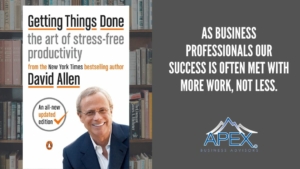Book Club #36 : Getting Things Done by David Allen
 Getting Things Done by productivity expert David Allen is a book that cannot be read without the reader battling their desire to put it down and to start putting into action its productivity lessons.
Getting Things Done by productivity expert David Allen is a book that cannot be read without the reader battling their desire to put it down and to start putting into action its productivity lessons.
It is precisely because the book gets to the heart of how to unlock one’s own productivity that the reader also cannot come away from the book without knowing that there exists a productivity guide which, with rare possible exception, truly works.
In short, Getting Things Done teaches the reader first how to think about thinking about getting things done, and then how to implement a process which is intuitive with the way people actually achieve productivity.
Whilst framed as a book for businessmen, managers, and entrepreneurs seeking efficiency and control of their working lives, the book also places an emphasis on being productive in all aspects of one’s life (for example, if the entrepreneur has forgotten to do a personal errand this will inevitably create discord in their work life as well).
Someday, Maybe
The reader will gain a clearer understanding of the limited ability of the human mind towards organizing tasks without external aid. For example, an individual may daydream about going on holiday for years without ever doing so. All the while a “go on holiday” note may have been gathering dust on a dream board somewhere in their home. There may come a time when they finally do decide to go, but only when there is little time left, with a “now-or-never” ultimatum attached to what should be an otherwise invigorating vacation.
Seemingly useful productivity habits such as creating ”’to-do lists” are revealed for the productivity roadblocks they are. To-do lists list tasks to be done, such as: “Sales Report.”
This task, at face value, does not define the actionable next steps. If these steps aren’t defined, then the individual faced with the task will not think through what those steps need to be until they cannot put the task off any longer.
One cannot do “sales report” but one can do “Define the purpose of the sales report.”
Each actionable step of the task can be broken down to its individual action.
For example, for “sales report,” it could be:
- Define the purpose of the sales report
- Gather Data
- Choose a Reporting Period
- Organize Data
And so on, until the actionable steps are defined so that there is full clarity about what needs to be done in order to see the task through to completion. Through creating these kinds of actionable task lists, the task doer will inevitably feel an urge to set upon the task immediately now that the thinking about the task has been done externally (put on paper, or in a word document, etc) to a sufficient level of scrutiny.
Our lives require a robust productivity system
There wouldn’t be a need for Getting Things Done if productivity relied only on clarifying the next actionable steps of a task. New tasks can present themselves to us at any time, and there are large portions of our lives where we must be somewhere (a doctor’s appointment, a wedding, etc), meaning our time for getting things done is limited.
As business professionals our success is often met with more work, not less. There are other books that explore the idea of freeing up one’s time whilst growing one’s business (such as The E-Myth Revisted by Michael Gerber). David Allen’s Getting Things Done offers the reader a “stuff” collection system which can be used to define and decide how best to see tasks through to completion. “Stuff” is defined as anything which we need to get done. Once the reader has digested the book’s wisdom once, there is a readily available “map” of David Allen’s entire productivity process to refer to for a quick refresher.
The Art of Stress-Free Productivity
Whilst it is too optimistic to assume the book removes stress from the art of being productive, it does explain what it is about not having a robust productivity system in place which causes us so much stress. When we have a task to do, and we haven’t defined when it needs to be done and all the actionable steps, we are forced to continually remember the task in the back of our minds lest we forget it. Because of this, our time spent not working, or working on other tasks, becomes stressful because we have not taken the time to decide what to do with the task.
Part of the genius of David Allen’s productivity system is how he creates a filing method for tasks. Collection, sorting, defining, and doing. Whether a professional chooses to take on all of the lessons from the book, or some, there is a wealth of insight to be found that is sure to bring a boost to your productivity.
Is one of the things you need to get done this year buying or selling a business? Put us at the top of your list.


